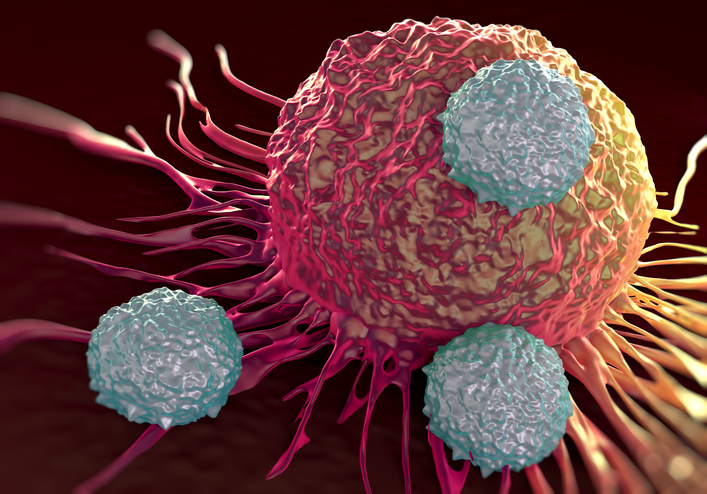
The potential cures from stem cell transplants come at a steep cost to the immune system. A necessary preconditioning regimen essentially wipes out the immune system to give the transplanted cells a better chance to do their work. The entire process can require hospitalization for weeks.
Tom Fuchs, CEO of biotech startup Cimeio Therapeutics proposes an alternative. His startup is developing technology that shields transplanted cells, thus avoiding the need for immunosuppression. According to Fuchs, that capability could make hematopoietic stem cell (HSC) transplants outpatient procedures, potentially expanding such treatments to more patients and more diseases. Hospitalization is about supporting patients without an immune system, he explained.
“If you could get around that, you could take this approach to other diseases,” Fuchs said. “If you don’t have to be completely immunosuppressed then maybe that risk/benefit profile looks different.”
Cimeio is starting to pull back the wraps on its technology. The company, which has operations in Boston and Basel, Switzerland, launched this week from Ridgeline Discovery Engine, the startup creator of venture capital firm Versant Ventures. Other biotech startups that Versant has launched from Ridgeline include Monte Rosa Therapeutics and Black Diamond Therapeutics. Versant is backing its latest company with a $50 million Series A round of funding.
The Cimeio technology comes from the laboratory of Lukas Jeker, a professor in the department of biomedicine at the University of Basel and also the startup’s senior vice president of gene editing. Alex Mayweg, managing director at Versant, said he learned about Jeker’s technology during a lunch meeting with the scientist about two years ago. Jeker explained that he was researching a way to edit a cell surface receptor simply by changing an amino acid. That change prevented the receptor from binding to an antibody, effectively shielding it from an antibody therapy or other biologic drug. Just as important, that change still preserved the receptor’s function.

A Deep-dive Into Specialty Pharma
A specialty drug is a class of prescription medications used to treat complex, chronic or rare medical conditions. Although this classification was originally intended to define the treatment of rare, also termed “orphan” diseases, affecting fewer than 200,000 people in the US, more recently, specialty drugs have emerged as the cornerstone of treatment for chronic and complex diseases such as cancer, autoimmune conditions, diabetes, hepatitis C, and HIV/AIDS.
Cimeio’s approach starts by understanding the biology of a cell, identifying what is a good target to shield, Fuchs said. The company then looks at the antibodies that are available or that could be developed to hit that target. With that information, Cimeio creates a map that allows it to see what happens if it inserts a particular amino acid variant. From there, it’s a testing process to find the change that will block the binding of the receptor yet also maintain its function.
Fuchs, a veteran of Genentech and Roche, said he joined Cimeio because of the technology’s potential. In addition to protecting HSCs in transplant procedures, the technology can also be used to shield adoptive cell therapies, he said. Shielded cells would be paired with an immunotherapy. The immunotherapy would kill off the diseased cells, clearing the way for the shielded transplanted cells to engraft in the patient. Immunotherapy could continue after the transplant procedure. The shielding of the transplanted cells protects them from the immunotherapy, which can be dosed again to address any diseased cells that remain following the initial treatment.
In preclinical studies, Cimeio has shielded cells from a range of therapies including antibody drugs, T cell engagers, antibody drug conjugates, and CAR T cells. The Cimeio technology could be applied both to currently available immunotherapies as well as new ones in development, Fuchs said. Cimeio is developing new immunotherapies for targets that can’t be hit now because they are also expressed on HSC or T cells so targeting them would make the patient sick. There is a different shield for each immunotherapy. The immunotherapies that are already available may become the basis of new partnerships. Fuchs said he’s had some conversations with pharmaceutical companies about the pairing of Cimeio’s technology with their products.
So far, Cimeio’s research has produced four programs. Fuchs said the most advanced of them is expected to produce therapeutic candidate by the end of the current quarter. From there, he estimates another 18 months to reach the clinic. A second therapeutic candidate could be selected by the end of this year. The Series A cash will support the work needed to get to an investigational new drug application for these programs. Fuchs said that the biotech field hasn’t talked much about the power of HSC transplants much because there hasn’t been as much innovation there. The Cimeio technology offers the potential to bring cures to many more patients.
“We’re taking a big swing here,” Fuchs said. “We’re not trying to improve survival by a little bit. We’re trying to bend the curve on some of these diseases.”
Photo: royaltystockphoto, Getty Images












